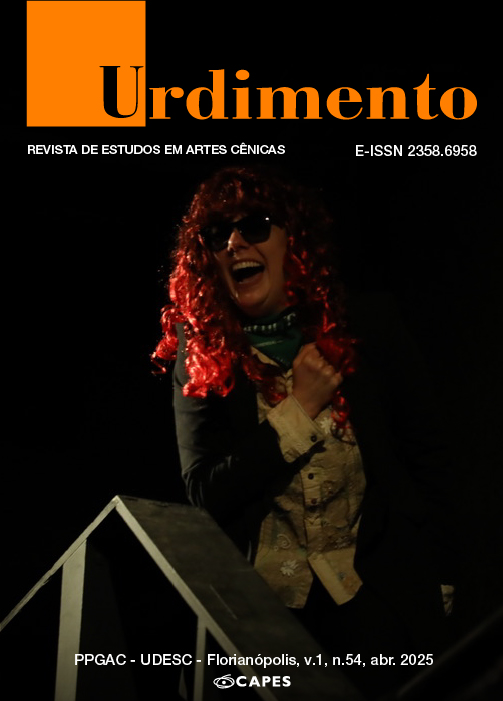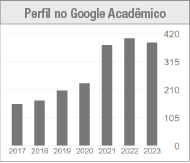Brecht and the experience of constructive incongruity: saying yes, saying no
DOI:
https://doi.org/10.5965/1414573101542025e109Keywords:
political theatre, russian vanguards, minor poetics, learning plays, theatrical pedagogiesAbstract
This article proposes a revision at Bertolt Brecht as a central reference in the conformation of our imaginary of a political theater and an engaged pedagogy. Starting from a discussion of the reified or mystified dimension of this figure, it proposes as lines of flight readings of Brechtian experiences with the political theater of the Russian avant-garde, as well as of Heiner Müller's reflections and criticisms of the learning play. The recognition of a Brecht who is more subversive than revolutionary does not diminish the importance of the Brecht myth as an idea-force that gives impetus to various political processes of scenic creation, but rather places it outside the function of being a model of a necessarily positive hope.
Downloads
References
ARENDT, Hanna. “Bertolt Brecht: 1898–1956”, publicado em Homens em Tempos Difíceis. São Paulo: Companhia das Letras, 2008.
BARTHES, Roland. Mitologias. Rio de Janeiro: Bertrand-Brasil, 1989.
BENJAMIN, Walter. “Tagebuchnotizen 1939”. Gesammelte Schriften VI, Frankfurt/Main: Suhrkamp, 1991.
BRECHT, Bertolt. Sobre a profissão do ator. Werner Hecht (org.). Trad. Laura Brauer e Pedro Mantovani. São Paulo: Editora 34, 2022.
BRECHT, Bertolt. “Aquele que diz sim. Aquele que diz não.” Trad. L. Martinez Corrêa e Marshall Netherland. In Teatro Completo 3. São Paulo: Paz e Terra, 2004, p. 213 - 232.
BRECHT, Bertolt. “A alma boa de Setsuan”. Trad. Geir Campos e Antônio Bulhões. In Teatro Completo 7. São Paulo: Paz e Terra, 1992.
CAVALIERE, Arlete. “Vanguardas Russas: a arte revolucionária”. RUS 8 -10, 19-35. 2017
COSTA, Iná Camargo. “Brecht e o Teatro Épico”. Palestra realizada no Teatro Fábrica em 03/05/2005 [mimeo].
CHKLOVSKY, Viktor. “A arte como procedimento”. In TODORV, Tvvetan (org.) Teoria da literatura: formalistas russos. São Paulo: Editora UNEPS, 2013.
CLARK, Mark. “Herói ou vilão? Bertolt Brecht e a crise de junho de 1953”. In Estudos Avançados, 21 (60), 2007.
DAVIS, David e O’SULLIVAN, Carmel. “Um salva-vidas apolítico”. Trad. André Carreira. In Urdimento – Revista de Estudos em Artes Cênicas. Florianópolis, n. 3, 2000.
EATON, Katherine. The Theater of Meyerhold and Brecht. Westport: Greenwood Press, 1985.
GATTI, Luciano. A Peça de Aprendizagem. Heiner Müller e o Modelo Brechtiano. São Paulo: Edusp, 2015.
HAUG, Wolfgang Fritz. “Kritik ohne Mitleid?” In KOCH, Gerd et al. Massnehmen. Kontroverse Perspektive Praxis Brecht/Eislers Lehrstück. Berlin: Theater der Zeit, 1998.
HORMIGON, Jose Antonio. Meyerhold: textos teóricos. Madrid: ADEE, 1992.
KOUDELA, Ingrid D., (org.) Heiner Müller. O Espanto no teatro. São Paulo: Perspectiva, 2003.
LANGHOFF, Matthias. “Entrevista” In Vintém, No. 1. São Paulo: Hucitec, 1998.
MIGUEL Luis Felipe. “Em Torno do Conceito de Mito Político”. In Dados vol. 41 n. 3 Rio de Janeiro, 1998.
PASTA, José Antonio. Trabalho de Brecht. São Paulo: Editora 34, 2010.
PAVIS, Patrice. Dicionário do Teatro. São Paulo: Perspectiva, 1999.
PICON-VALLIN, Béatrice. Meyerhold. Trad. Fátima Saadi, Isa Kopelman, J. Guinsburg e Marcio Honorio de Godoy. São Paulo: Perspectiva, 2013.
PISCATOR, Erwin. Teatro Político. Trad. Aldo Della Nina. Rio de Janeiro: Civilização Brasileira, 1968.
RUDNITSKY, Konstantin. Russian and Soviet Theatre: tradition and avant-garde. London: Thames & Hudson, 1988.
SASTRE, Afonso. “Ante Piscator, 1975”. In Teatro Político (Erwin Piscator). Hondarribia: Hiro, 2001.
SCHWARZ, Roberto. “Altos e baixos da atualidade de Brecht”. In Sequências brasileiras: ensaios. São Paulo: Companhia das Letras, 1999.
SESC. Programa do Seminário República de Weimar: Cultura e Política em Tempo de Crise, 2019. https://centrodepesquisaeformacao.sescsp.org.br/atividade/republica-de-weimar-cultura-e-politica-em-tempo-de-crise.
ŽIŽEK, Slavoj. “Brecht: a grandeza interna do stalinismo”. Trad. André Carreira) Urdimento – Revista de Estudos em Artes Cênicas. Florianópolis, n.9, 2007.
Published
How to Cite
Issue
Section
License
Copyright (c) 2025 Urdimento: Revista de Estudos em Artes Cênicas

This work is licensed under a Creative Commons Attribution 4.0 International License.
Copyright Statement
The articles published by the magazine are free to use. The copyright is all assigned to the magazine. The articles whose authors are identified represent the expression from the point of view of their authors and not the official position of the journal Urdimento. The author (s) undertakes whenever publishing material relating to the article published in Revista Urdimento mention the said publication as follows: This article was originally published by Urdimento magazine in its volume (put the volume), number (put the number) in the year of (put the year) and can be accessed at:
http://www.revistas.udesc.br/index.php/urdimento
This work is licensed under a Creative Commons Attribution 4.0 International License.




